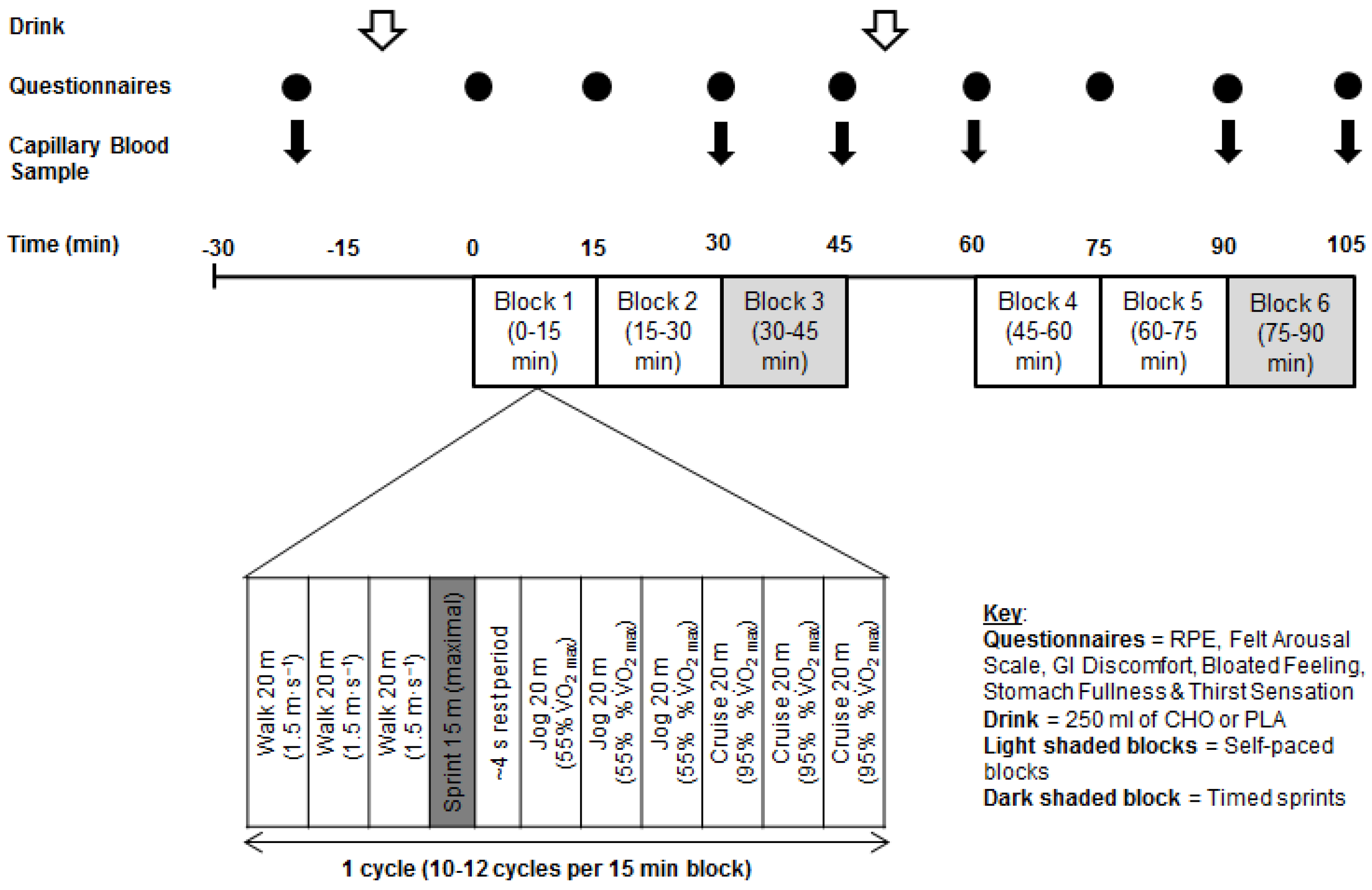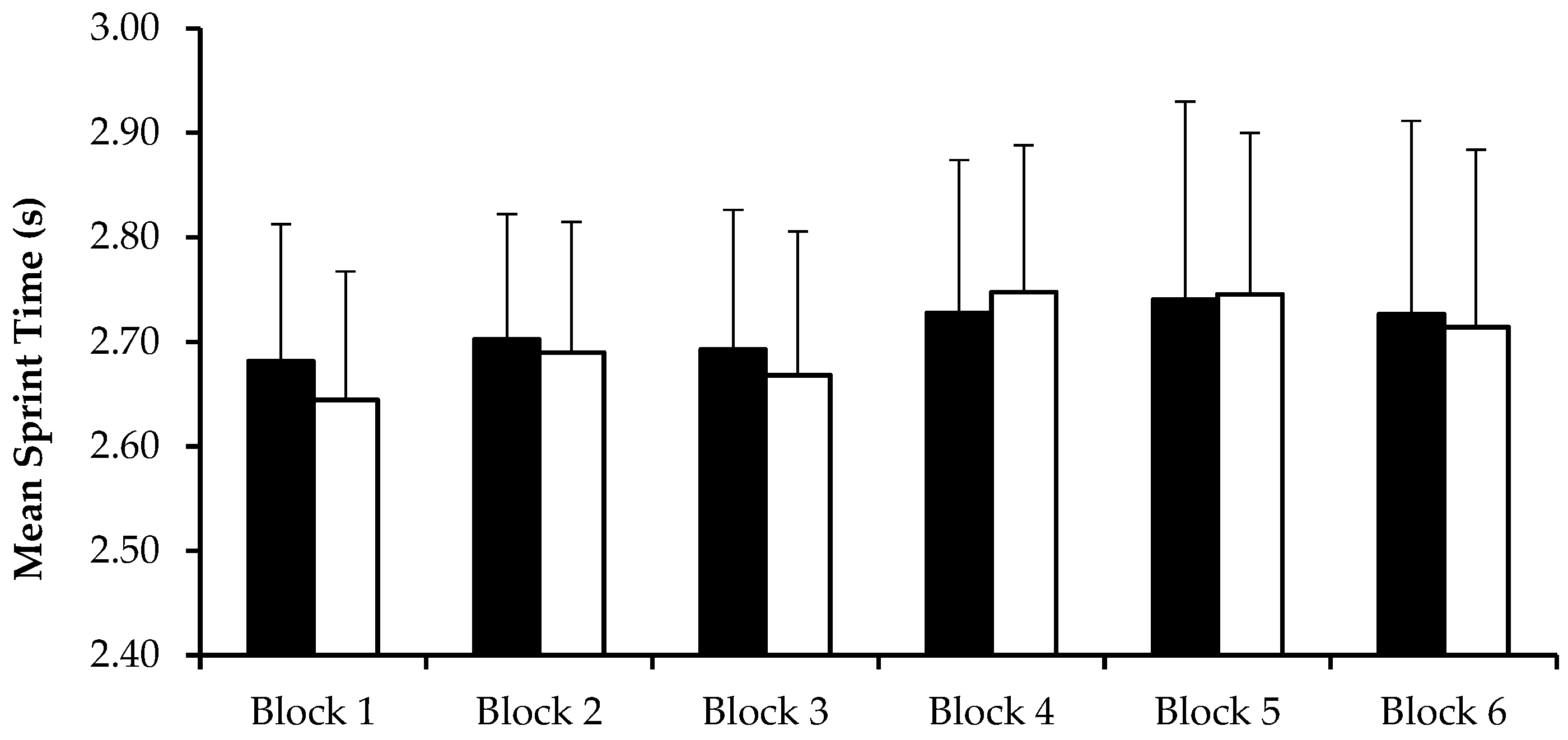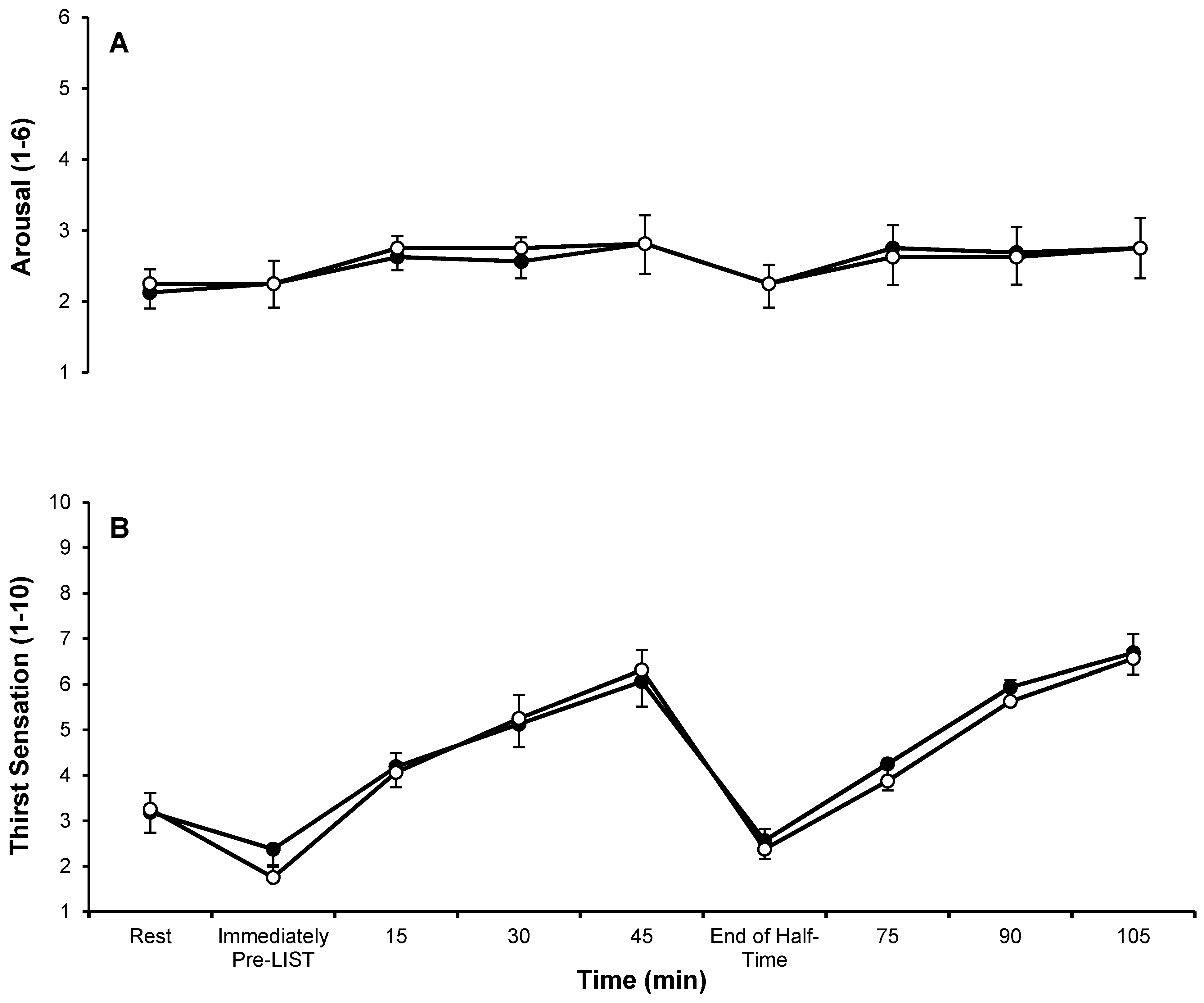Ecologically Valid Carbohydrate Intake during Soccer-Specific Exercise Does Not Affect Running Performance in a Fed State
Abstract
:1. Introduction
2. Materials and Methods
2.1. Subjects
2.2. Pre-Trial Standardisation
2.3. Preliminary Testing
2.4. Experimental Trials
2.5. Test Drinks
2.6. Statistical Analysis
3. Results
3.1. Pre-Trial Measures
3.2. Running Performance
3.3. Subjective Feelings Questionnaires
3.4. Physiological Measures
3.5. Perception of Test Drinks
4. Discussion
5. Conclusions
Acknowledgments
Author Contributions
Conflicts of Interest
References
- Coyle, E.; Hagberg, J.; Hurley, B.; Martin, W.; Ehsani, A.; Holloszy, J. Carbohydrate feeding during prolonged strenuous exercise can delay fatigue. J. Appl. Physiol. Respir. Environ. Exerc. Physiol. 1983, 55, 230–235. [Google Scholar] [PubMed]
- Coyle, E.; Coggan, A.; Hemmert, M.; Ivy, J. Muscle glycogen utilization during prolonged strenuous exercise when fed carbohydrate. J. Appl. Physiol. 1986, 61, 165–172. [Google Scholar] [PubMed]
- McConell, G.; Snow, R.; Proietto, J.; Hargreaves, M. Muscle metabolism during prolonged exercise in humans: Influence of carbohydrate availability. J. Appl. Physiol. 1999, 87, 1083–1086. [Google Scholar] [PubMed]
- Tsintzas, O.; Williams, C.; Boobis, L.; Greenhaff, P. Carbohydrate ingestion and single muscle fiber glycogen metabolism during prolonged running in men. J. Appl. Physiol. 1996, 81, 801–809. [Google Scholar] [PubMed]
- Coggan, A.; Coyle, E. Reversal of fatigue during prolonged exercise by carbohydrate infusion or ingestion. J. Appl. Physiol. 1987, 63, 2388–2395. [Google Scholar] [PubMed]
- Coggan, A.; Coyle, E. Carbohydrate ingestion during prolonged exercise: Effects on metabolism and performance. Exerc. Sport Sci. Rev. 1991, 19, 1–40. [Google Scholar] [CrossRef] [PubMed]
- Tsintzas, O.; Liu, R.; Williams, C.; Campbell, I.; Gaitanos, G. The effect of carbohydrate ingestion on performance during a 30-km race. Int. J. Sport Nutr. 1993, 3, 127–139. [Google Scholar] [CrossRef] [PubMed]
- Tsintzas, O.; Williams, C.; Singh, R.; Wilson, W.; Burrin, J. Influence of carbohydrate-electrolyte drinks on marathon running performance. Eur. J. Appl. Physiol. 1995, 70, 154–160. [Google Scholar] [CrossRef]
- Foskett, A.; Williams, C.; Boobis, L.; Tsintzas, K. Carbohydrate availability and muscle energy metabolism during intermittent running. Med. Sci. Sports Exerc. 2008, 40, 96–103. [Google Scholar] [CrossRef] [PubMed]
- Patterson, S.; Gray, S. Carbohydrate-gel supplementation and endurance performance during intermittent high-intensity shuttle running. Int. J. Sport Nutr. Exerc. Metab. 2007, 17, 445–455. [Google Scholar] [CrossRef] [PubMed]
- Welsh, R.; Davis, J.; Burke, J.; Williams, H. Carbohydrate and physical/mental performance during intermittent exercise to fatigue. Med. Sci. Sports Exerc. 2002, 34, 723–731. [Google Scholar] [CrossRef] [PubMed]
- Nicholas, C.; Nuttall, F.; Williams, C. The Loughborough intermittent shuttle test: A field test that simulates the activity pattern of soccer. J. Sports Sci. 2000, 18, 97–104. [Google Scholar] [CrossRef] [PubMed]
- Nicholas, C.; Williams, C.; Lakomy, H.; Phillips, G.; Nowitz, A. Influence of ingesting a carbohydrate-electrolyte solution on endurance capacity during intermittent, high-intensity shuttle running. J. Sports Sci. 1995, 13, 283–290. [Google Scholar] [CrossRef] [PubMed]
- Nicholas, C.; Tsintzas, K.; Boobis, L.; Williams, C. Carbohydrate-electrolyte ingestion during intermittent high-intensity running. Med. Sci. Sports Exerc. 1999, 31, 1280–1286. [Google Scholar] [CrossRef] [PubMed]
- Ali, A.; Williams, C.; Nicholas, C.; Foskett, A. The influence of carbohydrate-electrolyte ingestion on soccer skill performance. Med. Sci. Sports Exerc. 2007, 39, 1969–1976. [Google Scholar] [CrossRef] [PubMed]
- Ali, A.; Williams, C. Carbohydrate ingestion and soccer skill performance during prolonged intermittent exercise. J. Sports Sci. 2009, 27, 1499–1508. [Google Scholar] [CrossRef] [PubMed]
- Davis, J.; Welsh, R.; Alderson, N. Effects of carbohydrate and chromium ingestion during intermittent high-intensity exercise of fatigue. Int. J. Sport Nutr. Exerc. Metab. 2000, 10, 476–485. [Google Scholar] [CrossRef] [PubMed]
- Goedecke, J.; White, N.; Chicktay, W.; Mahomed, H.; Durandt, J.; Lambert, M. The effect of carbohydrate ingestion on performance during a simulated soccer match. Nutrients 2013, 5, 5193–5204. [Google Scholar] [CrossRef] [PubMed]
- Durnin, J.; Womersley, J. Body fat assessed from total body density and its estimation from skinfold thickness: Measurements on 481 men and women aged from 16 to 72 years. Br. J. Nutr. 1974, 32, 77–97. [Google Scholar] [CrossRef] [PubMed]
- Ramsbottom, R.; Brewer, J.; Williams, C. A progressive shuttle run test to estimate maximal oxygen uptake. Br. J. Sports Med. 1988, 22, 141–144. [Google Scholar] [CrossRef] [PubMed]
- Armstrong, L.; Pumerantz, A.; Fiala, K.; Roti, M.; Kavouras, S.; Casa, D.; Maresh, C. Human hydration indices: Acute and longitudinal reference values. Int. J. Sport Nutr. Exerc. Metab. 2010, 20, 145–153. [Google Scholar] [CrossRef]
- Ali, A.; Foskett, A.; Grant, N. Measuring intermittent exercise performance using shuttle running. J. Sports Sci. 2014, 32, 601–609. [Google Scholar] [CrossRef] [PubMed]
- Svebak, S.; Murgatroyd, S. Metemotivational dominance: A multimethod validation of reversal theory constructs. J. Personal. Soc. Psychol. 1985, 48, 107–116. [Google Scholar] [CrossRef]
- Jentjens, R.; Jeukendrup, A. High rates of exogenous carbohydrate oxidation from a mixture of glucose and fructose ingested during prolonged cycling exercise. Br. J. Nutr. 2005, 93, 485–492. [Google Scholar] [CrossRef] [PubMed]
- Borg, G. Psychophysical bases of perceived exertion. Med. Sci. Sports Exerc. 1982, 14, 377–381. [Google Scholar] [CrossRef] [PubMed]
- Phillips, S.; Sproule, J.; Turner, A. Carbohydrate ingestion during team games exercise: Current knowledge and areas for future investigation. Sports Med. 2011, 41, 559–585. [Google Scholar] [CrossRef] [PubMed]
- Burke, L.; Hawley, J.; Wong, S.; Jeukendrup, A. Carbohydrates for training and competition. J. Sports Sci. 2011, 29, 17–27. [Google Scholar] [CrossRef] [PubMed]
- Jeukendrup, A. Carbohydrate intake during exercise and performance. Nutrition 2004, 20, 669–677. [Google Scholar] [CrossRef] [PubMed]
- Sherman, W.; Peden, M.; Wright, D. Carbohydrate feedings 1 h before exercise improves cycling performance. Am. J. Clin. Nutr. 1991, 54, 866–870. [Google Scholar] [PubMed]
- Baker, L.; Rollo, I.; Stein, K.; Jeukendrup, A. Acute effects of carbohydrate supplementation on intermittent sports performance. Nutrients 2015, 7, 5733–5763. [Google Scholar] [CrossRef] [PubMed]
- Taylor, R.; Magnusson, I.; Rothman, D.; Cline, G.; Caumo, A.; Cobelli, C.; Shulman, G. Direct assessment of liver glycogen storage by 13C nuclear magnetic resonance spectroscopy and regulation of glucose homeostasis after a mixed meal in normal subjects. J. Clin. Investig. 1996, 97, 126–132. [Google Scholar] [CrossRef] [PubMed]
- Chryssanthopoulos, C.; Williams, C.; Nowitz, A.; Bogdanis, G. Skeletal muscle glycogen concentration and metabolic responses following a high glycaemic carbohydrate breakfast. J. Sports Sci. 2004, 22, 1065–1071. [Google Scholar] [CrossRef] [PubMed]




| Variable | Block 3 | Block 6 | ||
|---|---|---|---|---|
| CHO | PLA | CHO | PLA | |
| Total | ||||
| Distance Covered (km) | 2.07 ± 0.06 | 2.09 ± 0.08 | 2.04 ± 0.09 | 2.06 ± 0.08 |
| Mean Speed (km∙h−1) | 8.3 ± 0.3 | 8.3 ± 0.3 | 8.1 ± 0.3 | 8.2 ± 0.3 |
| Walking | ||||
| Distance Covered (km) | 0.66 ± 0.02 | 0.67 ± 0.02 | 0.65 ± 0.02 | 0.66 ± 0.03 |
| Mean Speed (km∙h−1) | 5.6 ± 0.2 | 5.7 ± 0.2 | 5.5 ± 0.2 | 5.6 ± 0.2 |
| 15 m Sprint | ||||
| Distance Covered (m) | 161 ± 7 | 161 ± 7 | 160 ± 7 | 160 ± 7 |
| Mean Sprint Time (s) | 2.69 ± 0.13 | 2.67 ± 0.14 | 2.73 ± 0.18 | 2.71 ± 0.17 |
| Mean Speed (km∙h−1) | 20.1 ± 1.0 | 20.3 ± 1.1 | 19.9 ± 1.3 | 20.0 ± 1.2 |
| Jogging | ||||
| Distance Covered (km) | 0.63 ± 0.03 | 0.63 ± 0.03 | 0.62 ± 0.04 | 0.63 ± 0.03 |
| Mean Speed (km∙h−1) | 10.9 ± 0.6 | 11.0 ± 0.7 | 10.7 ± 0.8 | 10.8 ± 0.7 |
| Cruising | ||||
| Distance Covered (km) | 0.62 ± 0.03 | 0.62 ± 0.03 | 0.60 ± 0.03 | 0.61 ± 0.03 |
| Mean Speed (km∙h−1) | 12.7 ± 0.4 | 12.9 ± 0.5 | 12.7 ± 0.4 | 12.7 ± 0.6 |
| Recovery Time | ||||
| Total (s) | 40 ± 5 | 38 ± 7 | 41 ± 7 | 39 ± 7 |
| Mean Per Lap (s) | 4 ± 0 | 4 ± 1 | 4 ± 1 | 4 ± 1 |
| Rest | 30 min | 45 min | End of Half-Time | 90 min | 105 min | |
|---|---|---|---|---|---|---|
| Blood glucose (mmol∙L−1) | ||||||
| CHO | 4.8 ± 0.8 | 5.0 ± 0.6 | 5.1 ± 0.6 | 6.6 ± 0.7 † | 4.1 ± 0.6 | 4.7 ± 0.6 |
| PLA | 5.2 ± 0.5 | 4.8 ± 0.6 | 5.1 ± 0.4 | 5.0 ± 0.7 | 4.6 ± 0.5 | 4.8 ± 0.6 |
| Blood lactate (mmol∙L−1) | ||||||
| CHO | 1.3 ± 0.2 | 3.5 ± 1.5 | 3.6 ±1.5 | 2.4 ± 0.9 | 3.4 ± 1.5 | 3.4 ± 1.4 |
| PLA | 1.3 ± 0.4 | 3.8 ± 1.6 | 3.7 ± 1.6 | 2.2 ± 0.9 | 3.1 ± 1.4 | 3.1 ± 1.4 |
| Rest | Block 1 | Block 2 | Block 3 | Block 4 | Block 5 | Block 6 | |
|---|---|---|---|---|---|---|---|
| Heart rate (beat∙min−1) | |||||||
| CHO | 63 ± 10 | 154 ± 11 | 166 ± 11 | 164 ± 10 | 157 ± 10 | 167 ± 11 | 162 ± 13 |
| PLA | 62 ± 10 | 154 ± 10 | 166 ± 11 | 165 ± 10 | 156 ± 10 | 164 ± 10 | 163 ± 11 |
| RPE (6–20) | |||||||
| CHO | - | 13 ± 2 | 14 ± 2 | 14 ± 2 | 14 ± 2 | 15 ± 2 | 16 ± 2 |
| PLA | - | 13 ± 2 | 14 ± 2 | 15 ± 2 | 14 ± 2 | 15 ± 2 | 16 ± 2 |
© 2017 by the authors; licensee MDPI, Basel, Switzerland. This article is an open access article distributed under the terms and conditions of the Creative Commons Attribution (CC-BY) license (http://creativecommons.org/licenses/by/4.0/).
Share and Cite
Funnell, M.P.; Dykes, N.R.; Owen, E.J.; Mears, S.A.; Rollo, I.; James, L.J. Ecologically Valid Carbohydrate Intake during Soccer-Specific Exercise Does Not Affect Running Performance in a Fed State. Nutrients 2017, 9, 39. https://doi.org/10.3390/nu9010039
Funnell MP, Dykes NR, Owen EJ, Mears SA, Rollo I, James LJ. Ecologically Valid Carbohydrate Intake during Soccer-Specific Exercise Does Not Affect Running Performance in a Fed State. Nutrients. 2017; 9(1):39. https://doi.org/10.3390/nu9010039
Chicago/Turabian StyleFunnell, Mark P., Nick R. Dykes, Elliot J. Owen, Stephen A. Mears, Ian Rollo, and Lewis J. James. 2017. "Ecologically Valid Carbohydrate Intake during Soccer-Specific Exercise Does Not Affect Running Performance in a Fed State" Nutrients 9, no. 1: 39. https://doi.org/10.3390/nu9010039
APA StyleFunnell, M. P., Dykes, N. R., Owen, E. J., Mears, S. A., Rollo, I., & James, L. J. (2017). Ecologically Valid Carbohydrate Intake during Soccer-Specific Exercise Does Not Affect Running Performance in a Fed State. Nutrients, 9(1), 39. https://doi.org/10.3390/nu9010039





